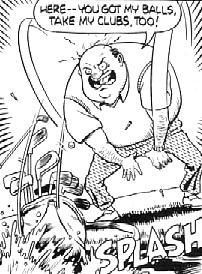Legend: Swearing off the game for good, a golfer launches the bag containing his clubs into a water
Example: [Reader's Digest, 1958]
As we waited to tee off on the 18th hole, a man in the foursome ahead drove three successive balls into the water. In a fury he picked up his golf bag and hurled it into the lake, then stamped off toward the clubhouse. We weren't surprised to see him sheepishly return a few minutes later, roll up his pants, take off his shoes and wade in after the clubs. It was what we'd expected. But to our amazement, he fished out the bag, unzipped the pocket, took out his car keys, flung the clubs into the water again and stalked off. |
Origins: This

tale has been around at least since the late 1950s, so it's hard to believe the legend might well have come true decades later. Even so, the following was presented as a news story in 1995:
Elderly Jean Potevan waded in fully-clothed when he realised his car keys were inside the bag. But he got entangled in weeds in Lyon, France, as he dived under the water. A pal said: "Golf made him bad-tempered. Still, he died as he would have wanted, playing the game."
A furious golfer hurled his bag of clubs into a lake after playing a duff
The death of the golfer is a neat twist on an old legend. Always before the tale ended with the still-furious man wading in after his golfbag, dragging the offending beastie back to shore, digging through it to retrieve his car keys, and once that mission was accomplished, flinging the unforgiven clubs back to their watery grave.
I'm left wondering about that news item, for it builds too cleverly on an existing legend. Even from the sketchy report, it's clear someone must have witnessed Potevan's
Potevan's aid? Indeed, why wasn't this person mentioned in the article?
Making the report further suspect is the lack of ordinary details that should have been included. Potevan's age. His home town. The name of the country club where this supposedly happened. Information about who he was golfing with (or, if no one, mention of his golfing alone). I would expect a real news story to kick off with: "Jean Potevan, 59, of Ellsmere, died yesterday when an attempt to regain his car keys from the golf bag he'd hurled into the water hazard on
News item or not, I'm left disbelieving it. The canonical form of this legend is told and retold wherever golfers gather and always as a story that really happened at another country club. That it could morph into a real life accident doesn't seem nearly as likely a scenario to me as someone slipping an old legend past an overworked newspaper editor.
Barbara "water hazard" Mikkelson
Last updated: 1 January 2005
 Sources:
Sources:
 Also told in:
Also told in:Healey, Phil and Rick Glanvill. Now! That's What I Call Urban Myths. London: Virgin Books, 1996. ISBN 0-86369-969-3 (pp. 244-245). The Big Book of Urban Legends. New York: Paradox Press, 1994. ISBN 1-56389-165-4 (p. 106).
